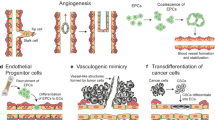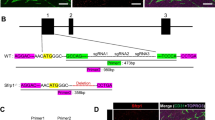Abstract
Purpose
Endothelial cell migration and survival might be called “major angiogenic responses”. Tumor conditioned medium (CM) has been widely used to stimulate endothelial cells to form capillary-like structures in angiogenesis models in vitro. However, the molecular events triggered by tumor CM are not fully understood. Here, we examined the effects of the CM from human lung carcinoma cell lines A549 and SPC-A-1 on cultures of primary human umbilical veins endothelial cells (HUVECs).
Methods
After treatment of HUVECs with the CM, cell migration was assessed by wound-healing assay, cell viability was evaluated by XTT assay, and apoptosis and cell death of HUVECs was analyzed by flow cytometry. Phosphorylation of Akt was assessed by Western blotting. To dissect the direct role of Akt, small interfering RNA (siRNA) against Akt1 was used.
Results
Both A549 and SPC-A-1 CM significantly stimulated cell migration. However, only A549 CM promoted cell viability and inhibited low serum-induced apoptosis and cell death of HUVECs, but SPC-A-1-CM showed no effects on survival of HUVECs. Meanwhile, A549 CM was found to be able to induce much more phosphorylation of Akt compared to SPC-A-1 CM treated group. The inhibitor of PI3K (wortmaninn) or Akt1 siRNA blocked A549 CM-induced migration and survival of HUVECs.
Conclusion
These results indicated that the angiogenic effects of A549 CM are largely mediated through activation of the PI3K-Akt in endothelial cells, and that the Akt1 is crucial in this process, which may provide a therapeutic target for decreasing tumor angiogenesis.






Similar content being viewed by others
References
Carmeliet P (2003) Angiogenesis in health and disease. Nat Med 9:653–660. doi:10.1038/nm0603-653
Chen WS, Xu PZ, Gottlob K, Chen ML, Sokol K, Shiyanova T, Roninson I, Weng W, Suzuki R, Tobe K et al (2001) Growth retardation and increased apoptosis in mice with homozygous disruption of the Akt1 gene. Genes Dev 15:2203–2208. doi:10.1101/gad.913901
Chen J, Somanath PR, Razorenova O, Chen WS, Hay N, Bornstein P, Byzova TV (2005) Akt1 regulates pathological angiogenesis, vascular maturation and permeability in vivo. Nat Med 11:1188–1196. doi:10.1038/nm1307
Cho H, Thorvaldsen JL, Chu Q, Feng F, Birnbaum MJ (2001) Akt1/PKBalpha is required for normal growth but dispensable for maintenance of glucose homeostasis in mice. J Biol Chem 276:38349–38352. doi:10.1074/jbc.C100462200
Dummler B, Hemmings BA (2007) Physiological roles of PKB/Akt isoforms in development and disease. Biochem Soc Trans 35:231–235. doi:10.1042/BST0350231
Folkman J (1995) Angiogenesis in cancer, vascular, rheumatoid and other disease. Nat Med 1:27–31. doi:10.1038/nm0195-27
Gerber HP, McMurtrey A, Kowalski J, Yan M, Keyt BA, Dixit V, Ferrara N (1998) Vascular endothelial growth factor regulates endothelial cell survival through the phosphatidylinositol 3′-kinase/Akt signal transduction pathway. Requirement for Flk-1/KDR activation. J Biol Chem 273:30336–30343. doi:10.1074/jbc.273.46.30336
Huang Y, Yang HJ, Jin Y, Li HM, Fu SB (2005) 13q14 aberration is related to the metastatic potential of human NSCLC. Yi Chuan 27:531–534
Jung YD, Ahmad SA, Liu W, Reinmuth N, Parikh A, Stoeltzing O, Fan F, Ellis LM (2002) The role of the microenvironment and intercellular cross-talk in tumor angiogenesis. Semin Cancer Biol 12:105–112. doi:10.1006/scbi.2001.0418
Kargiotis O, Chetty C, Gondi CS, Tsung AJ, Dinh DH, Gujrati M, Lakka SS, Kyritsis AP, Rao JS (2008) Adenovirus-mediated transfer of siRNA against MMP-2 mRNA results in impaired invasion and tumor-induced angiogenesis, induces apoptosis in vitro and inhibits tumor growth in vivo in glioblastoma. Oncogene 27:4830–4840. doi:10.1038/onc.2008.122
Mazure NM, Chen EY, Laderoute KR, Giaccia AJ (1997) Induction of vascular endothelial growth factor by hypoxia is modulated by a phosphatidylinositol 3-kinase/Akt signaling pathway in Ha-ras-transformed cells through a hypoxia inducible factor-1 transcriptional element. Blood 90:3322–3331
Oberringer M, Meins C, Bubel M, Pohlemann T (2008) In vitro wounding: effects of hypoxia and transforming growth factor beta1 on proliferation, migration and myofibroblastic differentiation in an endothelial cell-fibroblast co-culture model. J Mol Histol 39:37–47. doi:10.1007/s10735-007-9124-3
Risau W (1997) Mechanisms of angiogenesis. Nature 386:671–674. doi:10.1038/386671a0
Shaulian E, Karin M (2002) AP-1 as a regulator of cell life and death. Nat Cell Biol 4:E131–E136. doi:10.1038/ncb0502-e131
Shimada T, Nishimura Y, Nishiuma T, Rikitake Y, Hirase T, Yokoyama M (2007) Adenoviral transfer of rho family proteins to lung cancer cells ameliorates cell proliferation and motility and increases apoptotic change. Kobe J Med Sci 53:125–134
Shiojima I, Sato K, Izumiya Y, Schiekofer S, Ito M, Liao R, Colucci WS, Walsh K (2005) Disruption of coordinated cardiac hypertrophy and angiogenesis contributes to the transition to heart failure. J Clin Invest 115:2108–2118. doi:10.1172/JCI24682
Somanath PR, Razorenova OV, Chen J, Byzova TV (2006) Akt1 in endothelial cell and angiogenesis. Cell Cycle 5:512–518
van Nieuw Amerongen GP, Koolwijk P, Versteilen A, van Hinsbergh VW (2003) Involvement of RhoA/Rho kinase signaling in VEGF-induced endothelial cell migration and angiogenesis in vitro. Arterioscler Thromb Vasc Biol 23:211–217. doi:10.1161/01.ATV.0000054198.68894.88
Wang HQ, Huang LX, Qu MJ, Yan ZQ, Liu B, Shen BR, Jiang ZL (2006) Shear stress protects against endothelial regulation of vascular smooth muscle cell migration in a coculture system. Endothelium 13:171–180. doi:10.1080/10623320600760282
Wang HQ, Bai L, Shen BR, Yan ZQ, Jiang ZL (2007) Coculture with endothelial cells enhances vascular smooth muscle cell adhesion and spreading via activation of beta1-integrin and phosphatidylinositol 3-kinase/Akt. Eur J Cell Biol 86:51–62. doi:10.1016/j.ejcb.2006.09.001
Warner KA, Miyazawa M, Cordeiro MM, Love WJ, Pinsky MS, Neiva KG, Spalding AC, Nor JE (2008) Endothelial cells enhance tumor cell invasion through a crosstalk mediated by CXC chemokine signaling. Neoplasia 10:131–139. doi:10.1593/neo.07815
Ye J, Yuan L (2007) Inhibition of p38 MAPK reduces tumor conditioned medium-induced angiogenesis in co-cultured human umbilical vein endothelial cells and fibroblasts. Biosci Biotechnol Biochem 71:1162–1169. doi:10.1271/bbb.60617
Zeng Q, Li S, Chepeha DB, Giordano TJ, Li J, Zhang H, Polverini PJ, Nor J, Kitajewski J, Wang CY (2005) Crosstalk between tumor and endothelial cells promotes tumor angiogenesis by MAPK activation of Notch signaling. Cancer Cell 8:13–23. doi:10.1016/j.ccr.2005.06.004
Acknowledgments
This research was supported by grants from the National Natural Science Foundation of China, No. 30770535.
Conflict of interest statement
None.
Author information
Authors and Affiliations
Corresponding author
Additional information
M. L. Tu and H. Q. Wang contributed equally to this work.
Rights and permissions
About this article
Cite this article
Tu, M.L., Wang, H.Q., Chen, L.J. et al. Involvement of Akt1/protein kinase Bα in tumor conditioned medium-induced endothelial cell migration and survival in vitro. J Cancer Res Clin Oncol 135, 1543–1550 (2009). https://doi.org/10.1007/s00432-009-0601-9
Received:
Accepted:
Published:
Issue Date:
DOI: https://doi.org/10.1007/s00432-009-0601-9




